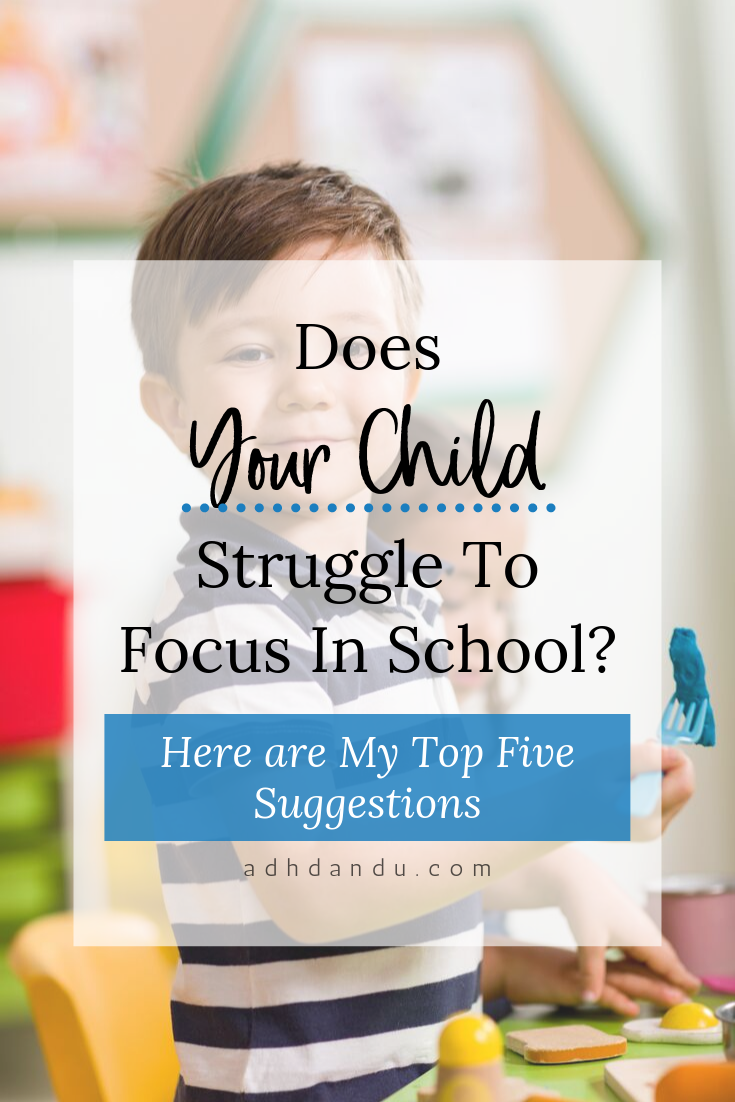When your child struggles to focus and learn in school, it can feel heart-wrenching. You worry that your child won’t be able to meet his goals, that you’ve failed him by not getting him tested sooner, and you feel TERRIBLE about how many times you lost your temper with him.
But here’s the thing:
Your child CAN still meet his goals with a diagnosis, like ADHD, dyslexia (a disorder of reading) or anxiety. Your child will just need specialized help. For some parents, this is really hard to face. But don’t let that stand in your way.
Denial is a normal part of parenting (e.g., Who wants to admit that their child has a “condition” that they will have to learn to manage; it’s way easier to think they’re just blowing you off when they don’t follow-through with your requests). Don’t beat yourself up about it. Instead, put your energy into building a support network for you and your child.

When your child can’t focus or learn as well as expected, one piece of advice I regularly give parents is to consider getting him or her evaluated by a child psychologist.
#1 Make sure you give your child’s teacher a copy of the evaluation.
Some families don’t want their child to be “labeled” at school, but one of the primary reasons psychologists, like me, put our blood, sweat, and tears into writing these reports, is because teachers need to know how to help your child. Plus, schools often can’t provide needed services for your child without a medical diagnosis.
#2 Ask the psychologist who made the diagnosis to help you prioritize the recommendations.
Pick the top three and put your energy there for now. Many parents feel they need to tackle every recommendation NOW, but that isn’t the truth. You’ll make yourself crazy that way. When my son was diagnosed, our top three must-do’s involved finding a good tutor (he was behind in reading and writing), working with my son’s kindergarten teacher about how to be more ADHD-supportive, and figuring out where my son should attend school in the fall. Other things had to wait.
#3 Find a good child or adolescent psychologist in your area and make an appointment.
Don’t try to walk this alone. I should have sought professional support sooner. Since I’m a child psychologist, I fooled myself into believing that since I had the “knowledge”, I could mange the stress. Not so. The specialist will help you problem-solve about all kinds of things, like homework, chores, electronic use, bedtime, you name it. You’ll feel empowered with your new knowledge and skills.
#4 Talk about your experience with the people you trust.
I realize there are still stigmas around diagnoses, like ADHD, but the truth is, you don’t want to spend your time with people who judge you anyway. Let your besties support you. Since ADHD is on the rise (7 to 11 % of school age children have it), your friends might even surprise you with their own ADHD experiences.
#5 Read Read Read.
Go to my resources page to find my favorite parenting books about ADHD. Become a member of national organizations, like Children and Adults with Attention Deficit Disorder (CHADD). Go to local seminars, parenting groups, and learn what you can about ADHD. But, don’t believe everything your read on the internet. And don’t spend a lot of money on “treatment” until you check it out with your child’s pediatrician, psychologist, or other professional who can advise you.
Signing off,
Your ADHD Guru and Friend!



Thank your for sharing these tips with us. I know someone can definitely use this information. Passing it along!
Thanks Kim,
I apprciate your support. Cori manages my website too and has referenced your work at times to give me examples. I really like your style and your mission. So many moms could use humor, practical advice, and a support system.
My webiste has been down due to content compatability issues with WordPress this past week, but in general, it’s coming along. I’d be happy to write a guest blog post for you sometime about parenting, motherhood and ADHD if you’d like. My book, Raising Will: Surviving the Brilliance and Blues of ADHD, just launched and I’ve been so slammed!
Best,
Katherine
Great information! I think this post will help many people out.
Number 1 is such a biggie! As a general education teacher, it is SO helpful when parents advocate for their kids. We have so many in our classroom and we don’t have a whole lot of professional development in exceptional learners that it is a big help when parents speak up for their kids. We want all our students to learn, and if you don’t tell us, sometimes we don’t know what they need.
Thank you Stacy. I really appeciate your comment, especially knowing that you are a general education teacher AND a mother. You are quite the blogger! I’m impressed with how many posts you have since I’m just getting started. What is your secret? Any advice for a beginner blogger like me?
I would love to send you a copy of my book for your review. If you liked it and mentioned it on your website that would be so nice. I would be happy to write a guest blog on your website if you have an interest in ADHD, as well.
Now that my book has launched (Raising Will: Surviving the Brilliance and Blues of ADHD) I will have time to start writing blogs again 🙂
Best,
Katherine
This is great information. I will pass this along to some friends.
Hi Patricia,
I really love the way to supoprt the not-so-crafty parents AND share great gluten-free recipes. I just joined your network and will mentioned it in my next newsletter. Many kids with ADHD have to avoid gluten (I bet you already know this), so parents I connect with will really appreciate your recipes and general attitude.
Sincerely,
Katherine
Thank you Patricia – I love the idea of supporting your blog, too. It takes a village 🙂 If you have any interest in guest blogging for each other let me know. We could try to work something out.
I love how far technology has come to where now parents can read and get advice from others such as yourself. These tips would have helped my parents out a great deal after my brother was diagnosed. Like you said, going to a specialist made a great deal and helped out tremendously.